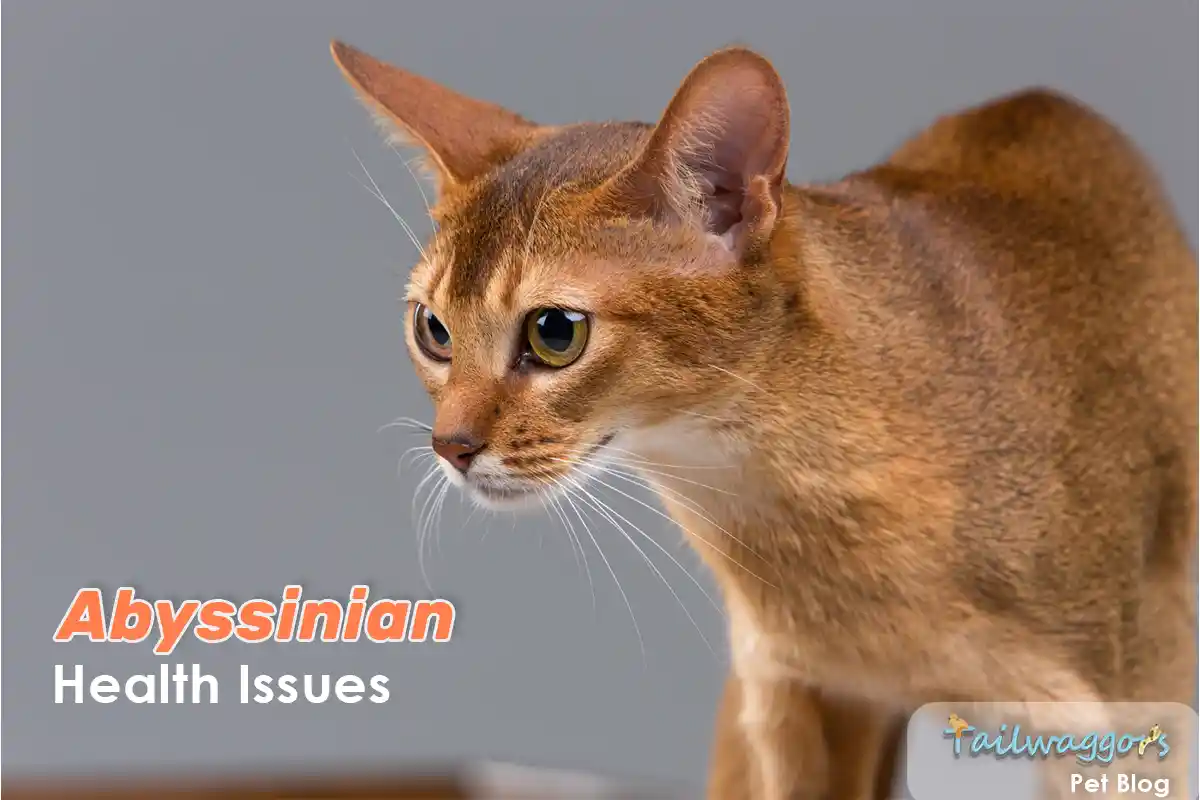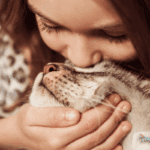{ “@context”: “https://schema.org”, “@type”: “Article”, “mainEntityOfPage”: { “@type”: “WebPage”, “@id”: “https://tailwaggors.com/abyssinian-cat-health-issues-2024-common-problems-prevention-tips/” }, “headline”: “Abyssinian Cat Health Issues in 2025: Common Problems & Prevention Tips”, “description”: “Discover the 7 most common health issues Abyssinian cats face and learn effective prevention strategies. This comprehensive guide, written by Dr. Esther Knoetze, covers symptoms, treatments, and expert care tips.”, “image”: { “@type”: “ImageObject”, “url”: “https://tailwaggors.com/wp-content/uploads/2024/11/Abyssinian-Health-Issues.webp”, “width”: 1200, “height”: 630 }, “author”: { “@type”: “Person”, “name”: “Dr. Esther Knoetze”, “honorificPrefix”: “Dr.”, “jobTitle”: “Veterinarian”, “description”: “Dr. Esther Knoetze is a trusted veterinarian with expertise in feline health and care, holding degrees in Veterinary Biology and Veterinary Science from the University of Pretoria.”, “credential”: [“BSc”, “BVSc”] }, “publisher”: { “@type”: “Organization”, “name”: “Tailwaggors”, “url”: “https://tailwaggors.com”, “logo”: { “@type”: “ImageObject”, “url”: “https://tailwaggors.com/wp-content/uploads/2024/10/Tailwaggors-Logo-120px.png” } }, “datePublished”: “2024-11-01T00:00:00+00:00”, “dateModified”: “2025-01-10T00:00:00+00:00”, “articleSection”: [ “Understanding Abyssinian Health: The Big Picture”, “The 7 Most Common Health Issues”, “Physical Therapy Exercise Guide”, “Cardiac Monitoring Guide”, “Comprehensive Prevention & Wellness Calendar”, “Abyssinian Wellness Timeline”, “Abyssinian Nutrition Guide”, “Abyssinian Care Cost Calculator”, “Conclusion: Your Abyssinian’s Health Journey”, “Expert Q&A: Your Abyssinian Questions Answered” ], “keywords”: [ “Abyssinian cat health issues”, “common Abyssinian health problems”, “Abyssinian genetic disorders”, “Abyssinian wellness guide”, “preventive care for Abyssinians”, “Abyssinian cat health testing” ], “tableOfContents”: [ “Understanding Abyssinian Health: The Big Picture”, “The 7 Most Common Health Issues”, “Physical Therapy Exercise Guide”, “Cardiac Monitoring Guide”, “Comprehensive Prevention & Wellness Calendar”, “Abyssinian Wellness Timeline”, “Abyssinian Nutrition Guide”, “Abyssinian Care Cost Calculator”, “Conclusion: Your Abyssinian’s Health Journey”, “Expert Q&A: Your Abyssinian Questions Answered” ], “audience”: { “@type”: “Audience”, “audienceType”: [ “Abyssinian cat owners”, “cat enthusiasts”, “prospective Abyssinian owners”, “feline breeders”, “veterinary professionals” ] } }
Key Takeaway: Abyssinian cats are prone to seven common health issues: Progressive Retinal Atrophy (PRA), Pyruvate Kinase Deficiency (PKDef), Periodontal Disease, Renal Amyloidosis, Patellar Luxation, Gingivitis, and Heart Problems. Early genetic testing, regular veterinary check-ups, and preventive care significantly enhance their health and lifespan, helping them thrive for years to come.
Is your Abyssinian’s health keeping you up at night? You’re not alone. As elegant as these cats are with their distinctive ticked coats and athletic builds, they come with their own set of health considerations that every owner should understand. While no cat breed is entirely free from health issues, Abyssinian cats have some unique traits that can affect their wellbeing.
Think of this guide as your roadmap to understanding and preventing the most common health challenges these remarkable cats face. We’ll explore everything from genetic predispositions to practical prevention strategies, backed by the latest research from leading veterinary institutions.
Did you know? Abyssinian cats who receive consistent preventive care, including genetic testing and proactive interventions, tend to live 3-4 years longer than cats relying solely on emergency care. (Vitale, 2024; Grahn, 2024)

Understanding Abyssinian Health: The Big Picture
Before diving into specific health conditions, it’s essential to recognize what sets Abyssinian cats apart medically. Recent findings from the Cornell Feline Health Center confirm that Abyssinians, while generally robust, have unique genetic traits requiring proactive care. While not every Abyssinian will develop health problems, some carry inherited predispositions that can lead to complications. Early genetic testing through reputable laboratories can identify potential risks, allowing for timely intervention.
| Health Factor | Abyssinian Cats | General Cat Population |
|---|---|---|
| Average Lifespan | 10-16 years | 12-18 years |
| Genetic Health Issues | 7 known | 4-5 known |
| Preventive Care Needs | Very High | Moderate |
| Dental Care Requirements | Very High | Moderate |
Genetic Predisposition Overview
Advancements in genetic testing have transformed Abyssinian healthcare. Institutions like the UC Davis Veterinary Genetics Laboratory and PawPrint Genetics have identified inherited traits requiring close attention. These tests are highly recommended within the first 6 months of life to aid in early prevention strategies.
Abyssinian Genetic Testing Guide
Detects mutations responsible for vision loss. Early testing is critical for Abyssinians.
Identifies carriers and affected cats to manage anemia risks proactively.
Screens for predispositions to kidney diseases, common in Abyssinians.
UC Davis Veterinary Genetics Laboratory
Offers a full genetic panel tailored to Abyssinians.
Results available within 10-15 business days.
PawPrint Genetics
Provides both individual and bundled genetic tests.
Results available within 14-21 business days.
Animal Genetics
Specializes in breed-specific genetic testing packages.
Results available within 7-14 business days.
What It Detects: This test identifies carriers or affected cats with a genetic mutation that causes anemia.
When to Test: Ideally performed by the time the kitten is 6 months old or earlier if anemia symptoms appear.
Actionable Insight: Breeders should ensure both parents are tested to prevent passing on the condition.
What It Detects: Detects genetic mutations linked to retinal degeneration, which can lead to blindness.
When to Test: Recommended during early kittenhood (around 3-6 months old) or before breeding.
Actionable Insight: Cats testing positive should not be bred to prevent propagation of PRA-related mutations.
What They Detect: These panels screen for a range of conditions, including renal and cardiac diseases commonly seen in Abyssinians.
When to Test: Suitable for kittens and adults during routine health assessments or pre-breeding evaluations.

The 7 Most Common Health Issues
Let’s examine the first two major health concerns in detail. Remember, early detection is key for successful treatment.
1. Progressive Retinal Atrophy (PRA)
Progressive Retinal Atrophy represents one of the most significant genetic challenges facing Abyssinian cats today (Cornell Feline Health Center, 2023). This inherited condition affects the retina, potentially leading to blindness if not monitored and managed properly.
Progressive Retinal Atrophy typically manifests between 1.5-2 years of age in affected Abyssinians. Genetic testing can identify both affected cats and carriers, making it a crucial tool for breeding programs and early intervention planning.
Early Warning Signs of PRA
Prevention and Management:
- Genetic testing before breeding
- Regular ophthalmological examinations starting at 6 months
- Early intervention when symptoms appear
- Environmental modifications as vision changes
- Safety-proofing home environment
PRO TIP: Early genetic testing for PRA is essential – we can identify carriers and affected cats before symptoms appear, allowing us to implement management strategies proactively.”- Dr. Esther Knoetze
2. Pyruvate Kinase Deficiency (PKD)
Normal Red Blood Cell
PKD Affected Cell
PKD symptoms range from mild anemia and fatigue in early stages to severe exercise intolerance and chronic lethargy as the disease progresses.
Genetic testing can confirm PKD mutations. Regular blood tests track the enzyme’s activity and detect the impact on red blood cells.
Supportive care includes fluid therapy, specialized diets, and, in severe cases, blood transfusions to manage anemia and maintain quality of life.
- Carrier (one defective gene)
- Affected (two defective genes)
- Early genetic testing available
- Important for breeding decisions
- Early signs: 6-12 months
- Clinical symptoms: 1-2 years
- Progression varies per individual
- Testing enables early intervention
- Progressive and lifelong condition
- Three key stages
- Ongoing monitoring needed
- Severity varies by case
Symptoms
- Mild anemia
- Occasional lethargy
Treatment
- Supportive care
- Balanced diet with antioxidants
Monitoring
- Monthly blood tests
Symptoms
- Moderate anemia
- Exercise intolerance
Treatment
- Periodic transfusions
- Iron or folic acid supplementation
Monitoring
- Bi-weekly blood work
Symptoms
- Severe anemia
- Chronic fatigue
Treatment
- Frequent transfusions
- Palliative care
Monitoring
- Weekly testing or more
3. Periodontal Disease & Gingivitis
Abyssinians have a higher-than-average risk of dental issues, which can escalate into painful infections if untreated. Research shows a direct connection between dental health and kidney function, making prevention crucial.
Professional Dental Care Timeline:
- Daily home care: Essential
- First dental check: 6 months of age
- Professional cleaning: Every 6-12 months
- Regular vet checks: Every 6 months
Disclosure: This website contains affiliate links. As an Amazon Associate, we earn from qualifying purchases at no additional cost to you. We only recommend products and services we trust and believe will be valuable to our readers. Thank you for supporting this website!
4. Renal Amyloidosis
This kidney condition occurs when amyloid proteins deposit in renal tissues, impairing function. This condition typically appears in middle-aged Abyssinians (4-7 years). Early detection through regular screening is essential for management.
Key Dietary Recommendations:
- Kidney-Support Diet: Low phosphorus and supplemented with omega-3 fatty acids for effective kidney support.
- Hydration Focus: Increase water intake with wet food and water fountain options.
- Protein Quality: Use high-quality proteins, adjusted based on kidney function.
- Regular urinalysis to check for abnormalities.
- Blood pressure monitoring to manage hypertension.
- Hydration levels to ensure proper kidney function.
- Blood Urea Nitrogen (BUN) and creatinine levels.
- Phosphorus levels in blood.
- Body weight and appetite tracking.
5. Patellar Luxation
Patellar luxation refers to the dislocation of the kneecap, which can cause discomfort or mobility issues.
Weight Management: Keeping your cat at an optimal weight reduces joint strain.
Physical Therapy: Gentle exercises can help strengthen the muscles surrounding the knee joint.
Physical Therapy Exercise Guide
- Start with 5-minute sessions
- Use flat, non-slip surfaces
- Gradually increase duration
- Monitor for fatigue
- Use treat motivation
- Support joints during movement
- Hold stretches for 3-5 seconds
- Repeat 3-5 times per session
- Install ramps for easier access
- Use stepped platforms
- Provide non-slip surfaces
- Add lower rest areas
6. Heart Problems in Abyssinians
Heart health is a critical aspect of caring for Abyssinians, as this breed is more prone to certain cardiac conditions. Hypertrophic cardiomyopathy (HCM), one of the most common issues, causes the heart muscle to thicken, making it harder for the heart to pump blood effectively. Other concerns include arrhythmias, which are irregular heartbeats, and valve disease, where the heart’s valves don’t function properly.
Key Symptoms to Watch For: Keep an eye out for signs such as unusual lethargy, rapid or labored breathing, and coughing. Early detection is vital to managing these conditions.
Proactive Monitoring: Schedule annual echocardiograms to assess heart function and catch problems early. Regular veterinary check-ups will help ensure your Abyssinian’s heart stays healthy and strong.
Cardiac Monitoring Guide
Ultrasound imaging of the heart to evaluate structure and function.
Measures electrical activity of the heart.
Measures systolic and diastolic blood pressure.
- Measure at rest
- Multiple readings needed
- Consider stress factors
Evaluates heart size and shape, lung fields, and blood vessels.
7. Feline Hyperesthesia Syndrome (FHS)
FHS, though less common, affects some Abyssinians. This neurological disorder is characterized by episodes of sudden activity, skin twitching, and vocalization.
Management: Environmental enrichment, stress reduction, and medications as prescribed by a veterinarian can help manage symptoms.

Comprehensive Prevention & Wellness Calendar
Age-Based Health Screening Timeline
Abyssinians benefit greatly from a structured wellness plan. Regular screenings at different life stages can prevent or mitigate many health issues.
Abyssinian Wellness Timeline
Nutrition & Care Guidelines
Diet plays a pivotal role in your cat’s health. Customizing their food based on life stage ensures they get the nutrients they need. For a comprehensive guide on Abyssinian cat diets, visit our Abyssinian Cat Diet 2025: Evidence-Based Veterinary Guide to Nutrition & Health.
Dietary Highlights:
- Kittens: High-protein kitten food enriched with DHA.
- Adults: Maintenance diets with balanced macronutrients.
- Seniors: Low-calorie diets with joint-supporting supplements.
Abyssinian Nutrition Guide
Kitten Requirements (0-12 months)
- High protein (35-40%) for growth
- Higher calorie needs to support energy
- Frequent small meals to match appetite
- Omega-3 fatty acids for brain and vision development
Adult Maintenance (1-7 years)
- Balanced protein (30-35%) for muscle health
- Moderate fat to prevent obesity
- Fixed feeding times to encourage routine
- Freshwater always available
Senior Adaptations (7+ years)
- Highly digestible proteins
- Joint support supplements (e.g., glucosamine)
- Moisture-rich diets to support kidney health
- Lower calorie intake for reduced activity levels
Special Health Conditions
- Kidney disease: Low phosphorus and moderate protein
- Heart conditions: Sodium-restricted diet
- Dental issues: Softer or texture-modified foods
Updated Cost Considerations
Understanding the costs and care involved in raising an Abyssinian is essential for every pet owner. To ensure the most accurate and helpful guidance, we’ve developed this user-friendly cost calculator. However, please keep in mind that costs may vary significantly depending on your region and local veterinary practices.
We recommend using this tool as a general guide and consulting with your local veterinarian for a personalized care plan and accurate cost estimates tailored to your area. Whether you’re budgeting for wellness exams or planning for unexpected emergencies, this calculator is here to help you prepare confidently for every stage of your Abyssinian’s life.
Abyssinian Care Cost Calculator
Cost Comparison with Insurance
Important Cost Disclaimer This cost calculator provides estimated ranges based on average U.S. prices as of 2024. Actual costs may vary significantly based on:
- • Your geographic location
- • Healthcare provider rates
- • Individual pet needs
- • Emergency situations
- • Market fluctuations
Always maintain an emergency fund beyond these estimates and consult with veterinary professionals for specific healthcare costs. Pet insurance options should be considered for unexpected expenses.
This tool is for planning purposes only and should not be considered financial advice.
Conclusion: Your Abyssinian’s Health Journey
Maintaining your Abyssinian’s health is a continuous journey that requires proactive care and informed decision-making. By staying vigilant and incorporating preventive strategies, you can help your cat live a long, happy life.
🐾 Is Your Aby Getting the Best Care?
Heart, kidney, genetic, or dental concerns—what worries you most about your Abyssinian? 🐈
Share this guide with fellow cat parents to spread awareness and prevent poisonings.
Expert Q&A: Your Abyssinian Questions Answered
- Progressive Retinal Atrophy (PRA): Causes gradual vision loss; genetic testing can confirm the carrier status.
- Pyruvate Kinase Deficiency (PKD): A hereditary condition leading to anemia; symptoms include lethargy and weight loss.
- Renal Amyloidosis: Affects kidney function; early signs include increased thirst and urination.
- A first-aid manual, bandages, antiseptic wipes, and medications.
- Contact numbers for your vet and emergency clinics.
- A carrier for safe transport and extra food and water for 3–5 days.
What to Read Next
Looking to dive deeper into Abyssinian care or learn more about cat health and safety? Check out these expert-approved guides:
- Abyssinian Cats: The Complete Guide to the Ancient Sacred Cat of Egypt (2025)
Discover the fascinating history, personality traits, and care tips for Abyssinians. - Abyssinian Cat Diet (2025): Evidence-Based Veterinary Guide to Nutrition and Health
Learn how to provide a balanced diet tailored to your Abyssinian’s specific needs. - The Complete Guide to Cat Proofing Your Home: Vet-Approved Safety Solutions (2025)
Keep your curious Abyssinian safe with our top cat-proofing tips. - How Many Cat Breeds? (2025): Complete Guide to Choosing the Perfect Breed
Compare Abyssinians with other breeds and find the purr-fect feline companion. - Veterinarian’s Complete Cat Emergency Guide: 5 Critical Components
Be prepared for emergencies with this comprehensive checklist. - Prevent Cat Poisonings: Essential Tips and Emergency Advice for Pet Owners
Protect your cat from common household hazards and toxic substances. - Toxic Plants for Cats: A Comprehensive Reference Guide
A must-read for cat owners who love plants and want to avoid accidents. - Vet-Approved New Cat Supply Checklist (2025): Essential Items and Cost Guide
Ensure you’re fully equipped for your Abyssinian with this detailed supply guide. - CBD Oil for Cats: Unlocking Serenity or Not?
Curious about the benefits of CBD oil for cats? Find out what the science says.















